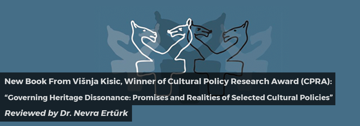KPY
New Book From Višnja Kisić: "Governing Heritage Dissonance: Promises and Realities of Selected Cultural Policies” (Reviewev Dr. Nevra Ertürk)

March '17
New Book From Višnja Kisić, Winner of Culturla Policy Research Award (CPRA): "Governing Heritage Dissonance: Promises and Realities of Selected Cultural Policies” (Reviewev Dr. Nevra Ertürk)
ECF is delighted to announce the publication of Governing Heritage Dissonance: Promises and Realities of Selected Cultural Policies – a pioneering study by Višnja Kisić, winner of the 2013 Cultural Policy Research Award (CPRA).
Drawing on illuminating case studies from South East Europe, Kisić connects heritage studies and cultural policies with issues of difference, conflict and reconciliation, prompting us to rethink how we approach the past and deal with diversities between cultures, nations and generations at a time of increasing fragmentation across Europe. Her timely analysis suggests ways of approaching our common heritage that could open up avenues to a better design for Europe’s common future.
About Cultural Policy Research Award (CPRA)
The Cultural Policy Research Award, from 2004 to 2013, honoured young and talented researchers (up to 35 years old) addressing topics of European relevance in the field of applied and comparative cultural policy. The award consisted of €10,000 for the accomplishment of a research project bringing valuable insights and proposals to inform policy-making and to benefit practitioners active in the field. The awardees were selected by an international jury in line with various criteria.
Digital space – Researchers’ Lab
ECF provides an online space where young and senior cultural policy researchers can meet, share knowledge, find information and collaborate. The Researchers’ Lab will continue to support young researchers to think and work transnationally, and to foster the community of scholars working on cultural policy in Europe and beyond.
Commentary by Turkish National Commission for UNESCO member Dr. Nevra Ertürk
 In the period after the disintegration of Yugoslavia, the book speaks about the heritage in the western part of Balkans together with the discussions, policies and practices related to this heritage; the concepts of culture and heritage are evaluated in the framework of contradictions, differences and conflicts.
In the period after the disintegration of Yugoslavia, the book speaks about the heritage in the western part of Balkans together with the discussions, policies and practices related to this heritage; the concepts of culture and heritage are evaluated in the framework of contradictions, differences and conflicts.
The reconciliatory, inclusionary and unifying role of the heritage in South East Europe, encountered with wars and divergences in recent past, is discussed through four striking examples.
The first example discusses about the "Stećci Medieval Tombstones Graveyards" serial property recorded in the UNESCO World heritage List in 2016, which combines 28 sites and located in Bosnia and Herzegovina, western Serbia, western Montenegro and central and southern Croatia. These cemeteries that had been subject to claims for property rights in the past, is a good example of the joint interpretation of the common heritage.
The travelling exhibit, “Imagining the Balkans: Identities and Memory in the long 19th century” is a common interpretation of twelve different national stories in South Eastern Europe in the long history of the 19th century.
"New Old Museum" Project discusses about the issue of contradictions and heritage from a different perspective for the reason that it narrates the history of Yugoslavia, a non-existent country today, by including all stakeholders of the Yugoslavian heritage.
The last example discussed in the book is the turning of the personal memories on war into an online museum in the Croatian Memory Archive. In this example, which portrays how heritage methodologies are used in the context of human rights, personal recollections are portrayed against the official public memory with a pluralistic language.
(KPY, 2017)